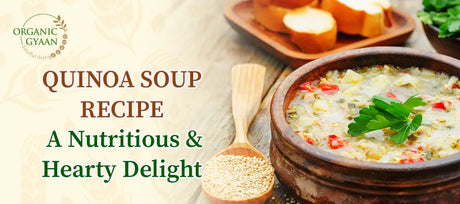
Quinoa Soup Recipe: A Nutritious & Hearty Delight
By Organic Gyaan
Wholesome, gluten-free quinoa (or millet) soup made without onion or garlic—light, nourishing, and perfect for digestion and daily wellness.
Read more





Siridhanya Millets, or Five Positive Millets, are nutrient-rich ancient grains that have been part of Indian diets for centuries. Unlike refined grains, siridhanya unpolished millets are packed with fiber, protein, and essential minerals, making them a healthier choice.
Switching to positive millets supports digestion, boosts energy, and helps manage diabetes and heart health. More than just food, millets are a sustainable choice that benefits both your health and the environment.
Each of the siridhanya millets has unique nutritional benefits that make them essential for a healthy lifestyle:
Sridhanya Millets aren’t just another food option- they’re a lifestyle change! Switch to these powerhouse grains today and feel the difference in your energy, digestion, and overall well-being.
Your journey to a healthier, more sustainable future starts here. Grab your pack of Sridhanya Millets now!
Think millets are boring? Think again! You can use them just like rice to create:
All our recipes are waiting for you in the Recipe Blog section—go check them out and get cooking!
1. What are siridhanya millets/positive millet?
Siridhanya millets are five nutrient-rich grains: Foxtail, Kodo, Little, Barnyard, and Browntop millets. They are high in fiber, support digestion, regulate blood sugar, and promote overall health.
2. Why are siridhanya millets considered positive millets?
Siridhanya millets are classified as positive millets due to their high fiber-to-carbohydrate ratio (above 8%), helping in blood sugar control, digestion, and detoxification. Among the five positive millets, each variety provides unique health benefits.
3. What are the health benefits of siridhanya millets/positive millet?
They help regulate blood sugar, improve digestion, boost immunity, and support weight management. The five positive millets also promote heart health and detoxification.
4. How should siridhanya millets/positive millets be consumed for maximum benefits?
Soak siridhanya millets for 6-8 hours before cooking for better digestion. Rotating positive millets in meals and consuming them four to five times a week ensures balanced nutrition.
5. Are siridhanya millets/positive millet gluten-free?
Yes, siridhanya millets are naturally gluten-free, making them suitable for people with gluten intolerance or celiac disease.
6. How can I use siridhanya millets/positive millet in cooking?
They can replace rice and be used in porridge, dosa, idli, khichdi, roti, and salads. Positive millets, including the five positive millets, are also great for snacks like laddus and cookies.
7. How should I store siridhanya millets/positive millet?
Store siridhanya millets in an airtight container in a cool, dry place. Refrigeration helps in long-term storage.
8. How is each type of siridhanya millet/positive millet different?
Foxtail boosts energy, Kodo aids detoxification, Little supports digestion, Barnyard is rich in iron, and Browntop improves gut health. The five positive millets provide diverse nutrients.
9. How often should siridhanya millets/positive millet be included in the diet?
Siridhanya millets should be consumed four to five times a week for maximum health benefits.
10. Can siridhanya millets/positive millet help with weight management?
Yes, they are high in fiber, keeping you full for longer, reducing cravings, and supporting metabolism.
11. What are the cooking tips for siridhanya millets/positive millet?
Soak before cooking, rinse well, and use 2.5 to 3 cups of water per cup of millet. They can be cooked like rice in an open pot or pressure cooker.
12. What are the recommended cooking methods for siridhanya millets/positive millet?
They can be steamed, fermented for dosa and idli, sprouted, slow-cooked, or baked for millet-based snacks.
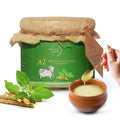 Best Quality Guaranteed
Best Quality Guaranteed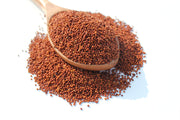 Free from Chemical & Pesticides | NO GMO
Free from Chemical & Pesticides | NO GMO
 Best Quality Guaranteed
Best Quality Guaranteed Free from Chemical & Pesticides | NO GMO
Free from Chemical & Pesticides | NO GMO
 Best Quality Guaranteed
Best Quality Guaranteed Free from Chemical & Pesticides | NO GMO
Free from Chemical & Pesticides | NO GMO
 Best Quality Guaranteed
Best Quality Guaranteed Free from Chemical & Pesticides | NO GMO
Free from Chemical & Pesticides | NO GMO
 Best Quality Guaranteed
Best Quality Guaranteed Free from Chemical & Pesticides | NO GMO
Free from Chemical & Pesticides | NO GMO
 Best Quality Guaranteed
Best Quality Guaranteed Free from Chemical & Pesticides | NO GMO
Free from Chemical & Pesticides | NO GMO
 Best Quality Guaranteed
Best Quality Guaranteed Free from Chemical & Pesticides | NO GMO
Free from Chemical & Pesticides | NO GMO
 Best Quality Guaranteed
Best Quality Guaranteed Free from Chemical & Pesticides | NO GMO
Free from Chemical & Pesticides | NO GMO
 Best Quality Guaranteed
Best Quality Guaranteed Free from Chemical & Pesticides | NO GMO
Free from Chemical & Pesticides | NO GMO
 Best Quality Guaranteed
Best Quality Guaranteed Free from Chemical & Pesticides | NO GMO
Free from Chemical & Pesticides | NO GMO
 Best Quality Guaranteed
Best Quality Guaranteed Free from Chemical & Pesticides | NO GMO
Free from Chemical & Pesticides | NO GMO
 Best Quality Guaranteed
Best Quality Guaranteed Free from Chemical & Pesticides | NO GMO
Free from Chemical & Pesticides | NO GMO
 Best Quality Guaranteed
Best Quality Guaranteed Free from Chemical & Pesticides | NO GMO
Free from Chemical & Pesticides | NO GMO
 Best Quality Guaranteed
Best Quality Guaranteed Free from Chemical & Pesticides | NO GMO
Free from Chemical & Pesticides | NO GMO
 Best Quality Guaranteed
Best Quality Guaranteed Free from Chemical & Pesticides | NO GMO
Free from Chemical & Pesticides | NO GMO
 Best Quality Guaranteed
Best Quality Guaranteed Free from Chemical & Pesticides | NO GMO
Free from Chemical & Pesticides | NO GMO
 Best Quality Guaranteed
Best Quality Guaranteed Free from Chemical & Pesticides | NO GMO
Free from Chemical & Pesticides | NO GMO
 Best Quality Guaranteed
Best Quality Guaranteed Free from Chemical & Pesticides | NO GMO
Free from Chemical & Pesticides | NO GMO
 Best Quality Guaranteed
Best Quality Guaranteed Free from Chemical & Pesticides | NO GMO
Free from Chemical & Pesticides | NO GMO
 Best Quality Guaranteed
Best Quality Guaranteed Free from Chemical & Pesticides | NO GMO
Free from Chemical & Pesticides | NO GMO

By Organic Gyaan
Wholesome, gluten-free quinoa (or millet) soup made without onion or garlic—light, nourishing, and perfect for digestion and daily wellness.
Read more
By Organic Gyaan
Millet kheer is a wholesome twist to traditional dessert—rich in fiber, calcium, and flavor. A perfect blend of health, tradition, and indulgence!
Read more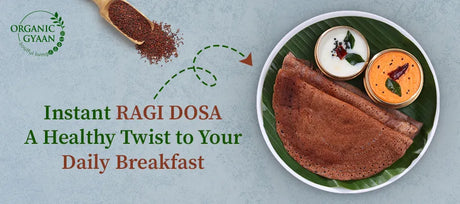
By Organic Gyaan
Instant Ragi Dosa is your perfect 15-min satvik breakfast—gluten-free, diabetic-friendly, and rich in calcium, fiber, and plant protein. Try it today!
Read more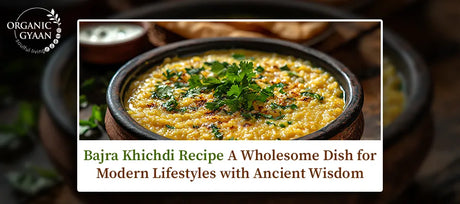
By Organic Gyaan
Discover the goodness of bajra khichdi—a simple, nourishing meal packed with fiber, protein, and ancient wisdom for modern, mindful living.
Read more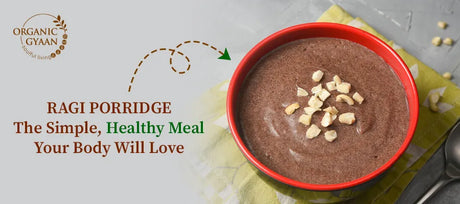
By Organic Gyaan
Ragi porridge is a simple, nourishing meal rich in calcium, fiber, and iron—perfect for kids, diabetics, and anyone seeking wholesome wellness.
Read more
By Organic Gyaan
Looking for a wholesome, plant-based meal? Try Millet Rajma Salad—a high-protein, low-GI, fiber-rich recipe perfect for diabetes, weight loss, and energy.
Read more
By Organic Gyaan
Millet pongal is the ultimate comfort food—wholesome, gut-friendly, and perfect for weight loss, diabetes, and daily nourishment. A smart, tasty swap!
Read more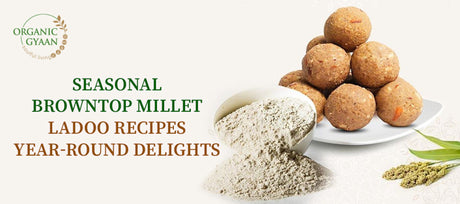
By Organic Gyaan
Brown Top Millet Ladoo is a nutritious and delicious snack that combines the goodness of brown top millet with the richness of traditional Indian sweets.
Read moreWe currently ship to the United States, Canada, Australia and the UK. To enquire about shipping to a different destination, please contact us.
Standard shipping normally takes 3-5 days. Next day shipping is available on all domestic orders (for an additional charge). International shipping times depend on the products and destination (estimated at checkout).
Items must be returned within 30 days after receiving your order. Items must be returned in the same condition in which they were received, be unworn/unused, have any tags still attached, and include all the original packaging.
Refunds are processed within 7 days from when we receive the item(s).







Siridhanya Millets, or Five Positive Millets, are nutrient-rich ancient grains that have been part of Indian diets for centuries. Unlike refined grains, siridhanya unpolished millets are packed with fiber, protein, and essential minerals, making them a healthier choice.
Switching to positive millets supports digestion, boosts energy, and helps manage diabetes and heart health. More than just food, millets are a sustainable choice that benefits both your health and the environment.
Each of the siridhanya millets has unique nutritional benefits that make them essential for a healthy lifestyle:
Sridhanya Millets aren’t just another food option- they’re a lifestyle change! Switch to these powerhouse grains today and feel the difference in your energy, digestion, and overall well-being.
Your journey to a healthier, more sustainable future starts here. Grab your pack of Sridhanya Millets now!
Think millets are boring? Think again! You can use them just like rice to create:
All our recipes are waiting for you in the Recipe Blog section—go check them out and get cooking!
1. What are siridhanya millets/positive millet?
Siridhanya millets are five nutrient-rich grains: Foxtail, Kodo, Little, Barnyard, and Browntop millets. They are high in fiber, support digestion, regulate blood sugar, and promote overall health.
2. Why are siridhanya millets considered positive millets?
Siridhanya millets are classified as positive millets due to their high fiber-to-carbohydrate ratio (above 8%), helping in blood sugar control, digestion, and detoxification. Among the five positive millets, each variety provides unique health benefits.
3. What are the health benefits of siridhanya millets/positive millet?
They help regulate blood sugar, improve digestion, boost immunity, and support weight management. The five positive millets also promote heart health and detoxification.
4. How should siridhanya millets/positive millets be consumed for maximum benefits?
Soak siridhanya millets for 6-8 hours before cooking for better digestion. Rotating positive millets in meals and consuming them four to five times a week ensures balanced nutrition.
5. Are siridhanya millets/positive millet gluten-free?
Yes, siridhanya millets are naturally gluten-free, making them suitable for people with gluten intolerance or celiac disease.
6. How can I use siridhanya millets/positive millet in cooking?
They can replace rice and be used in porridge, dosa, idli, khichdi, roti, and salads. Positive millets, including the five positive millets, are also great for snacks like laddus and cookies.
7. How should I store siridhanya millets/positive millet?
Store siridhanya millets in an airtight container in a cool, dry place. Refrigeration helps in long-term storage.
8. How is each type of siridhanya millet/positive millet different?
Foxtail boosts energy, Kodo aids detoxification, Little supports digestion, Barnyard is rich in iron, and Browntop improves gut health. The five positive millets provide diverse nutrients.
9. How often should siridhanya millets/positive millet be included in the diet?
Siridhanya millets should be consumed four to five times a week for maximum health benefits.
10. Can siridhanya millets/positive millet help with weight management?
Yes, they are high in fiber, keeping you full for longer, reducing cravings, and supporting metabolism.
11. What are the cooking tips for siridhanya millets/positive millet?
Soak before cooking, rinse well, and use 2.5 to 3 cups of water per cup of millet. They can be cooked like rice in an open pot or pressure cooker.
12. What are the recommended cooking methods for siridhanya millets/positive millet?
They can be steamed, fermented for dosa and idli, sprouted, slow-cooked, or baked for millet-based snacks.
Weight
HIGH NUTRITIONAL VALUE
Organic foods preserve far more vitamins & minerals
NO CHEMICALS & PESTICIDES
We don’t use artificial fertilisers or additives in our food
CERTIFIED ORGANIC SOURCES
Our products quality is verified by top certification bodies
PRESERVES THE ENVIRONMENT
Sustainable farming ensures soil conversation & reduced air pollution